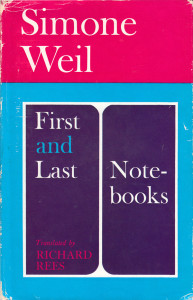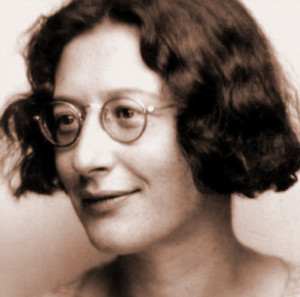How to Make Use of Our Suffering: Simone Weil on Ameliorating Our Experience of Pain, Hunger, Fatigue, and All That Makes the Soul Cry
SPIRITUALITY, 25 May 2015
Maria Popova, Brain Pickings – TRANSCEND Media Service
“To make use … of the sufferings that chance inflicts upon us is better than inflicting discipline upon oneself.”
 Long before scientists had empirical evidence of the astounding ways in which our minds affect our bodies, French philosopher and political activist Simone Weil (February 3, 1909–August 24, 1943) — one of the most remarkable thinkers of the past century, whom Albert Camus aptly proclaimed “the only great spirit of our times” — examined the delicate relationship between our physical and spiritual suffering, between the anguish of the material body and that of the soul.
Long before scientists had empirical evidence of the astounding ways in which our minds affect our bodies, French philosopher and political activist Simone Weil (February 3, 1909–August 24, 1943) — one of the most remarkable thinkers of the past century, whom Albert Camus aptly proclaimed “the only great spirit of our times” — examined the delicate relationship between our physical and spiritual suffering, between the anguish of the material body and that of the soul.
A few months before her painful yet stoic death from tuberculosis — despite her diagnosis and her doctor’s explicit orders to eat heartily, Weil consumed only what was rationed to her compatriots under the German Occupation in a remarkable gesture of solidarity, ultimately resulting in fatal malnutrition — she turned to the problem of pain in First and Last Notebooks (public library), the same out-of-print treasure that gave us Weil on temptation and the key to discipline.
In an entry from late 1942, Weil considers how our instinctive reaction to suffering often only amplifies our pain:
The way to make use of physical pain. When suffering no matter what degree of pain, when almost the entire soul is inwardly crying “Make it stop, I can bear no more,” a part of the soul, even though it be an infinitesimally small part, should say: “I consent that this should continue throughout the whole of time, if the divine wisdom so ordains.” The soul is then split in two. For the physically sentient part of the soul is — at least sometimes — unable to consent to pain. This splitting in two of the soul is a second pain, a spiritual one, and even sharper than the physical pain that causes it.
 There is almost a Buddhist undertone to Weil’s insistence on accepting everything that is, as it is, without compounding pain with “the second arrow” of our tendency to resist any unpleasantness and judge it as a kind of personal failure, which in turn precipitates an even graver sense of dissatisfaction. One is reminded at once of the Chinese philosophy of wu-wei and of Rilke’s famous words — “Let everything happen to you: beauty and terror.”
There is almost a Buddhist undertone to Weil’s insistence on accepting everything that is, as it is, without compounding pain with “the second arrow” of our tendency to resist any unpleasantness and judge it as a kind of personal failure, which in turn precipitates an even graver sense of dissatisfaction. One is reminded at once of the Chinese philosophy of wu-wei and of Rilke’s famous words — “Let everything happen to you: beauty and terror.”
Indeed, Weil’s philosophy of suffering embraces Rilke’s everythingness — she extends it beyond physical pain and into other forms of bodily and spiritual discomfort that we habitually exacerbate by stiffening with resistance to the unpleasantness:
A similar use can be made of hunger, fatigue, fear, and of everything that imperatively constrains the sentient part of the soul to cry: I can bear no more! Make it stop! There should be something in us that answers: I consent that it should continue up to the moment of death, or that it should not even finish then, but continue for ever. Then it is that the soul is as if divided by a two-edged sword.
To make use in this way of the sufferings that chance inflicts upon us is better than inflicting discipline upon oneself.
Weil’s First and Last Notebooks, hard though it may be to find, is a perennially profound read from cover to cover — an intensely intimate glimpse of one of the most significant minds of the twentieth century, whose ideas influenced such luminaries as Susan Sontag, Iris Murdoch, Flannery O’Connor, and Cornel West. Complement this particular passage with C.S. Lewis on how suffering confers agency upon life and Nietzsche on why a full life requires embracing rather than running from suffering.
_____________________________
Brain Pickings is the brain child of Maria Popova, an interestingness hunter-gatherer and curious mind at large obsessed with combinatorial creativity who also writes for Wired UK and The Atlantic, among others, and is an MIT Futures of Entertainment Fellow. She has gotten occasional help from a handful of guest contributors.
Go to Original – brainpickings.org
DISCLAIMER: The statements, views and opinions expressed in pieces republished here are solely those of the authors and do not necessarily represent those of TMS. In accordance with title 17 U.S.C. section 107, this material is distributed without profit to those who have expressed a prior interest in receiving the included information for research and educational purposes. TMS has no affiliation whatsoever with the originator of this article nor is TMS endorsed or sponsored by the originator. “GO TO ORIGINAL” links are provided as a convenience to our readers and allow for verification of authenticity. However, as originating pages are often updated by their originating host sites, the versions posted may not match the versions our readers view when clicking the “GO TO ORIGINAL” links. This site contains copyrighted material the use of which has not always been specifically authorized by the copyright owner. We are making such material available in our efforts to advance understanding of environmental, political, human rights, economic, democracy, scientific, and social justice issues, etc. We believe this constitutes a ‘fair use’ of any such copyrighted material as provided for in section 107 of the US Copyright Law. In accordance with Title 17 U.S.C. Section 107, the material on this site is distributed without profit to those who have expressed a prior interest in receiving the included information for research and educational purposes. For more information go to: http://www.law.cornell.edu/uscode/17/107.shtml. If you wish to use copyrighted material from this site for purposes of your own that go beyond ‘fair use’, you must obtain permission from the copyright owner.